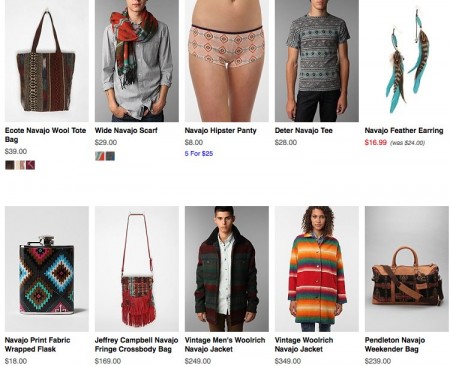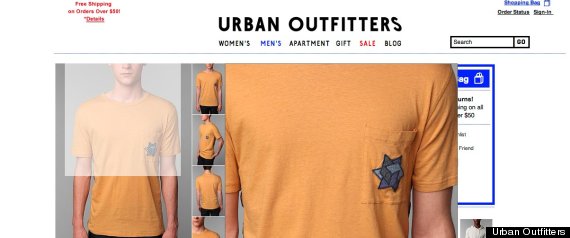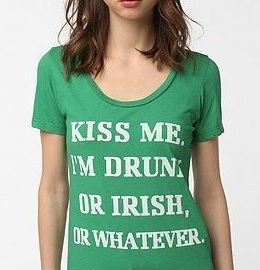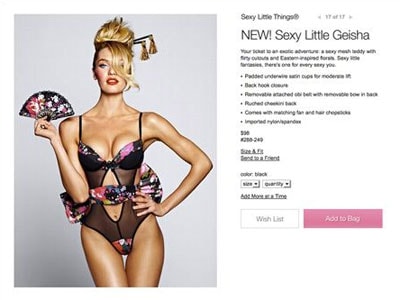Welcome to College Fashion’s biweekly column, Fashionably Informed. As a CF reader, it’s clear that you love fashion. But have you ever wondered about the drama that goes on behind the scenes? To keep you up to speed, this column aims to inform you about important issues and controversies in the fashion industry.
In case you missed them, see past posts on Retouching & Photoshopping, Tanning Promotion in the Media, Hypocrisy in Beauty Marketing, Racism in the Modeling Industry, “White-Washing” & Skin Lightening, and Homosexuality in the Fashion Industry.

Urban Outfitters’ “Navajo”-Inspired Clothing Line | Photo Credit
For this week’s post, we are returning to our series on racism in the fashion industry. Over the past few months, we have discussed Racism in the Modeling Industry and “White-Washing” & Skin Lightening. This time, we are tackling a slightly different topic: cultural appropriation andstereotyping of culture and ethnicity in retail fashion.
This topic idea was derived from a suggestion by CF reader Amanda. She commented on the last article in our series on racism, saying:
I would be interested in seeing an article on the appropriation of other cultures in the fashion industry. Especially prominent right now is the appropriation of Native American and Asian cultures. Anyway, thanks again!
Thank you, Amanda, for your excellent suggestion. Just last week, media outlets went wild about Victoria’s Secret’s “Sexy Little Geisha” costume,but we will get to the topic later in this post.
The Victoria’s Secret controversy is just one example among many: Numerous retailers have offended consumers by portraying races and cultures in stereotypical and negative ways, or trivializing cultures by turning them into “trends.” Native American and Asian cultures are perhaps appropriated and stereotyped the most in the US, however this issue affects a wide range of cultural groups.
Given that today is both Columbus Day and Indigenous People’s Day, it’s an ideal time to raise awareness about the topic, in hopes that we can all recognize these acts when they occur and work together to change the way cultures are portrayed in fashion.
While stereotyping and appropriation happen across the industry – in magazines and ads, and on the runways – today, we’re going to focus on controversies surrounding popular retail stores.
Table of Contents
First, a Few Definitions
Before we get started, let’s define a few terms so we’re all on the same page.
According to Wikipedia, “cultural appropriation” is defined as follows:
Cultural appropriation is the adoption of some specific elements of one culture by a different cultural group. It describes acculturation or assimilation, but can imply a negative view towards acculturation from a minority culture by a dominant culture. It can include the introduction of forms of dress or personal adornment, music and art, religion, language, or social behavior. These elements, once removed from their indigenous cultural contexts, can take on meanings that are significantly divergent from, or merely less nuanced than, those they originally held.
When we refer to “stereotypes,” we are using the following definition, again from Wikipedia. (Note the differences between stereotypes, prejudices, and discrimination):
Stereotypes, prejudice and discrimination are understood as related but different concepts. Stereotypes are regarded as the most cognitive component, prejudice as the affective and discrimination as the behavioral component of prejudicial reactions. In this tripartite view of intergroup attitudes, stereotypes reflect expectations and beliefs about the characteristics of members of groups perceived as different from one’s own, prejudice represents the emotional response, and discrimination refers to actions.
Although related, the three concepts can exist independently of each other. According to Daniel Katz and Kenneth Braly, stereotyping leads to racial prejudice when people emotionally react to the name of a group, ascribe characteristics to members of that group, and then evaluate those characteristics.
Now that we all understand what these terms mean, let’s talk about some recent examples of appropriation and stereotyping in retail fashion. Below, I’ll lay out a few different incidents affecting a number of cultural groups.
Urban Outfitters
Urban Outfitters has been accused several times of portraying cultures in a negative or inappropriate manner. Each time, they have stated that they had no intention of offending anyone. In many cases, UO has ended up removing the offending items from stores.
“Navajo” Clothing Line
About a year ago, Urban Outfitters came under fire for their “Navajo”-inspired clothing line. The fashion retailer featured several designs that they labeled as “Navajo” (see top photo above). These included a “Navajo Hipster Panty” and a “Navajo Print Fabric Wrapped Flask.”
While numerous people found these items offensive, perhaps no one was more insulted than the Navajo National Government. They were firstly offended by the portrayal of their culture as a mere fashion trend. However, an additional problem was that these “trendy” items were labeled “Navajo”.
According to The Globe and Mail, the Navajo National Government “holds a dozen trademarks on the name, encompassing clothing, textiles, household products and other items.” Consequently, the Navajo Nation Government sent a cease-and-desist letter to Urban Outfitters, demanding that they remove the trademarked name from the items in question.
In a statement to the Associated Press, the tribe’s attorney said,
“When products that have absolutely no connection to the Navajo Nation, its entities, its people, and their products are marketed and retailed under the guise that they are Navajo in origin, the Navajo Nation does not regard this as benign or trivial. It takes appropriate action to maintain distinctiveness and clarity of valid name association in the market and society.”
Along with the Navajo National Government, numerous Native Americans across the country were deeply offended. On the news blog, Racialicious, guest contributor Sasha Houston Brown wrote an open letter to Urban Outfitters’ CEO. In it, she said,
In all seriousness, as a Native American woman, I am deeply distressed by your company’s mass marketed collection of distasteful and racially demeaning apparel and décor. I take personal offense to the blatant racism and perverted cultural appropriation your store features this season as “fashion.”
In response to the demands of the Navajo National Government and other offended individuals, Urban Outfitters told the Associated Press,
“Like many other fashion brands, we interpret trends and will continue to do so for years to come. The Native American-inspired trend and specifically the term ‘Navajo’ have been cycling through fashion, fine art and design for the last few years.”
While Urban Outfitters denied any wrongdoing in their statement, they subsequently removed the word “Navajo” from the products in question. The Hufington Post reported that the offensive items were renamed.
Despite Urban Outfitters’ actions to re-name the products, according to The Guardian, the Navajo Government filed a lawsuit against the company. The fashion retailer removed the “Navajo” name from the products on their website – however, the lawsuit asserted that the names remained in other places. The Guardian explains:
But the lawsuit claims that products with the Navajo name were still being sold through other company brands, such as Free People, in catalogues and retail outlets.
The lawsuit is still ongoing, as is the controversy.
“Jewish Star” T-Shirt

Urban Outfitters’ shirt featuring “Jewish Star” | Photo Credit
Earlier this year, Urban Outfitters featured a shirt on their website that deeply insulted the Jewish community and others. The problem was that the shirt (pictured directly above) had a patch on its pocket that bore a strong resemblance to the Star of David, which Jewish individuals were forced to wear during the Holocaust.
The Huffington Post reported that the star outraged the Anti-Defamation League (ADL) of Philadelphia. In their statement about the controversy, ADL’s regional director wrote,
We find this use of symbolism to be extremely distasteful and offensive, and are outraged that your company would make this product available to your customers.
The shirt was deemed offensive due to the Star of David’s connection to the Holocaust and Nazism. However, the brand, WoodWood, who produced the shirt, denied any intentional representation of the Holocaust. In response to ADL’s statement, WoodWood stated the following:
First of all the graphic is not the Star of David, and I can assure you that this is in no way a reference to Judaism, Nazism or the holocaust. The graphic came from working with patchwork and geometric patterns for our spring/summer collection ‘State of Mind’. However when we received the prototype of this particular style we did recognize the resemblance, which is why we decided not to include the star patch on the final production T-shirt. I assume the image people have reacted to come from Urban Outfitters´ web site. This must be a photograph of an early sample, which is of course an error. Here is the actual T-shirt as it is in stores. I am sorry if anyone was offended seeing the shirt, it was of course never our intention to hurt any feelings with this.
As you can see from the statement, WoodWood denied that the star was a reference to Judaism, but also claimed that the shirt published on Urban Outfitters’ site was an early sample of the t-shirt. To WoodWood’s credit, the final product did not include the star in any way.
However, this was not the only time Urban Outfitters offended members of the Jewish community. According to the ADL, UO produced another shirt that many found offensive. This shirt included the phrase, “Everyone Loves a Jewish Girl,” surrounded by dollar signs. After a largely negative response, UO pulled the shirt.
St. Patrick’s Day Collection

Urban Outfitters’ St. Patrick’s Day T-Shirt
Urban Outfitters also came under fire for their portrayal of the Irish community, specifically because of their St. Patrick’s day mechandise. The fashion retailer was accused of supporting negative stereotypes of Irish and Irish-Americans. The offending collection included tanks and t-shirts with sayings such as “Kiss Me. I’m Drunk, or Irish, or Whatever.” (pictured above) and “Irish I was Drunk.”
Members of the Irish community demanded that Urban Outfitters pull the items, which they deemed offensive. According to Politicker, Joe Crowley, the co-chair of the legislature’s Ad Hoc Committee on Irish Affairs, wrote a letter to the company’s CEO demanding the products be removed. In his letter, Crowley explains the effects of the clothing items:
We recently learned of images used by Urban Outfitters in its St. Patrick’s Day clothing line that depict severe and negative stereotypes of Irish and Irish-American people as well as may promote binge drinking. We strongly urge you to end the sale of these items.
Urban Outfitters has not responded to this controversy.
Abercrombie and Fitch
Of course, Urban Outfitters is not the only brand to come under fire for their portrayals of cultural groups. Abercrombie and Fitch caused outrage when they began selling t-shirts that featured what some deemed a stereotypical portrayal of Asian individuals and culture.The San Francisco Chronicle reported that the shirts featured “caricatured faces with slanted eyes and rice-paddy hats.” One of the shirts also included the phrase, “Wong Brothers Laundry Service — Two Wongs Can Make It White.”
Abercrombie’s representation of Asian culture, to many, demonstrated the historic stereotypes often placed on the Asian community. This stereotypical representation outraged numerous people and many demanded the removal of these shirts. Despite the negative response, a spokesperson from Abercrombie’s PR firm told the SF Chronicle,
“We personally thought Asians would love this T-shirt. We are truly and deeply sorry we’ve offended people”
In a follow-up article, The SF Chronicle reported that after protests and threats of boycotts, Abercrombie and Fitch removed the shirts from their stores and website.
Victoria’s Secret and the “Sexy Little Geisha”

Victoria’s Secret “Sexy Little Geisha” Costume | Photo Credit
Last week, numerous media outlets reported about the controversy surrounding Victoria’s Secret “Sexy Little Geisha” costume (pictured above). The costume includes a sheer and floral printed body suit, a fan, and chopsticks meant for your hair. The lingerie company was accused by many blogs and news sites of perpetuating stereotypes of Asian women by selling this costume.
Racialicious cited the important historical context that surrounds this costume and the idea it represents. They stated,
Donning a “sexy Geisha” outfit to get the ball rolling in the bedroom remains offensive because it confirms a paradigm in which Asian people and their culture can be modified and sexualized and appropriated for the benefit of the West. This particular kind of racism has existed for a long time, and we’re far from moving beyond it.
The Frisky also refered to the long-standing stereotype of the “sexualized” Asian woman, saying,
It’s an entire outfit — a sex costume, really — based on the accoutrements of the Japanese geisha to make your lingerie “exotic” and signify the sexual submission and exploitation of Asian women.
Numerous other blogs and articles echoed Racialicious and The Frisky’s comments about the controversy. While the representation of the stereotype of Asian women as hyper-sexualized and submissive caused outrage, many were also upset by the use of the term “Geisha.” The Frisky pointed out the not-so-glamous past of geishas,
Considering the complicated history of geishas, repurposing the “look” for a major corporation to sell as role-playing lingerie seems a bit tasteless.
Due to the negative response, Victoria’s Secret has removed the costume from their website. As of this article’s publication, Victoria’s Secret has yet to release a statement regarding the controversy.
More Information
As this issue is incredibly multifaceted, it would be impossible to adequately explain it all in one post. For more information on cultural appropriation and stereotyping as it relates to all forms of fashion, we recommend the following web resources:
- Cultural Etiquette: A Guide for the Well-Intentioned, an essay by Amoja Three-Rivers, is a guide to the complex issue of cultural appropriation, and how to celebrate cultures you find beautiful in a respectful way.
- But What if I Want to Wear Indigenous Jewelry?, from Selchie Productions, explains the dos and don’ts of buying and wearing indigenous pieces.
- “We’re a culture, not a costume” this Halloween, from CNN, discusses cultural appropriation and stereotyping in Halloween costumes.
- Racialicious’ “Fashion” section is an excellent resource for in-depth info on all of the above controversies, plus many more.
What do you think?
What do you think about these incidents? Are you offended by the portrayal of certain cultures in stores? Have you noticed similar incidents of stereotyping? What do you think of the companies and brands’ responses to these controversies?
Would you like to see a follow-up post on this topic? If so, what incidents would you like to see covered?
Tell us your thoughts by leaving a comment.

This may not be the most popular of comments, but I don’t think this issue is as black and white as the article/comments make it sound. For one thing, the “Star of David” shirt does actually have a cool color scheme and the star looked cool, although its placement was not thoughtful. I also think the Irish shirt seems to make fun of people who decide to be “Irish” only on St. Patty’s which is pretty ridiculous.
That Abercrombie & Fitch situation was inexcusable though. Seriously, “we personally thought Asians would love this t-shirt.”??? Come on guys
Kate, I think the point of departure from honouring their culture begins with intention and the implicit connotations in their marketing choices. When brands decide to “go wild” or “experience the delights of the east” to loosely evoke a sense of Africa or Asia, they are conforming to and exacerbating stereotypes about an absence of civility, or plainly fetishizing the Oriental Other. Surely honouring their culture cannot mean treating it as a mere fashion trend (Re: Urban Outfitters and Navajo), or stripping traditional cultural dress of its modesty and authenticity by adding floral or red accents to simulate some perverted, tacky version of a geisha. The point of mainstream fashion is certainly not to honour other cultures. To believe that would be naive.
College Fashion – thank you for writing about this.
Great article!
Same thing with the Rromani culture, culture appropiation and sexualization at it´s finest. Also, Romani is the actual name, and not the slur word of the ethnic group of “g*psies”.
Wow. A lot to think about here.
I do have to say, though–I am multiracial (Native American, African, and Irish), and none of it offends me. While I am very connected to my cultures (especially my Native, as I am half), I have always been of the mindset that it doesn’t matter what anyone else thinks, or does. Is some of it offensive? Sure. Does it offend me personally? No. What do I care what some random people try to sell on a website, especially when I have so many other people outraged on my behalf? My oldest daughter, who is even more mixed than I am (a quarter Hawaiian, a quarter hispanic, a quarter Native, and the other quarter African and Irish), I hope will grow up the same way– proud of her many cultures, but indifferent to what anyone else thinks. After all– soon we will all be multicultural, and then, what will it all matter?
This is not to say that I don’t understand *why* people are upset. I do. I have friends that are. But I also think that there comes a point when everyone is trying to be *so* politically correct that we are walking on eggshells constantly. You want to wear my people’s Native prints? Fine. But don’t get mad when *I’m* wearing a “White Power” shirt just for kicks 😉 Everyone needs to lighten up, take a deep breath, and concentrate on what’s *really* important. Just my opinion.
Another great article about the controversies in fashion. Thank you, I really enjoy reading them!
While I agree with this article and think this is a real issue in apparel and retail… the geisha issue tripped me up a bit.
maybe I’m confused, but I believed geisha originated from a version of legal prostitution popular in Japan a really long time ago, which evolved into more of an art form/cultural thing. If it originated from …prostitutes, then how is itoffensive culturally to sell lingere with that title/theme? (If anything it sounds more like a feminist issue of appropriateness). Maybe someone with more knowledge on the topic wants to clear this up for me, cause I think I’m missing something.
Anyways, great post!
I am doing my undergrad in Anthropology, so issues like these are often brought up in my classes. I am extremely pleased to see that CF is taking these issues seriously as well. You girls rock…. keep up the good work!
I think part of it is intention, Kate. There’s a distinction to be made for when you’re supporting locals by purchasing their goods (parts of their culture they WANT to make available) and when places like Urban Outfitters try to take things that aren’t theirs and try to turn a profit.
I’ve long been aware of the horrible cultural appropriation, racism and other offensive merchandise from Urban Outfitters, especially. They’ve produced everything from “Navajo” underwear to an explicit greeting card offensive to transgendered persons, and they sell “ironic” Mitt-Romney-supporting t-shirts to left-wing hipsters. They do not apologize for anything. I am disgusted with them.
I would urge conscientious shoppers to research the controversial actions of Urban Outfitters before shopping there, and avoid their merchandise if possible.
Kate, I think there’s a big difference between buying jewelry directly from a culture and this kind of “geisha girl” lingerie nonsense. There’s an article up there about it.
If anyone wants to see this kind of thing on full display, you’re in luck, it’s the perfect time of the year! Just pop into any Halloween store.
At what point does it become appropriation instead of honoring their culture? I’m not trying to start an argument, but I’m genuinely interested in hearing other people’s opinions. I wouldn’t argue that any of the examples you gave aren’t appropriation/stereotypes; they’re pretty clear. But other things can be a little more hazy.
There is a lot of controversy associated with “white girls” running around taking pictures of themselves in war bonnets. I can clearly see what problem there is with that. But, I do own things from other cultures that I love and wear frequently As an example, I love Navajo jewelry, and wear it frequently. Actual Navajo jewelry, purchased on a reservation. I also have Moroccan, Turkish and Afghan jewelry. As none of these pieces have religious/historical significance that I can think of, is it safe to say wearing it is showing appreciation for their artistic heritage, and not appropriation? Or am I missing something here that makes it not okay?
Once again, I’m not trying to start an argument. I just am genuinely curious about where the line is drawn.
The US has a long sordid history of oppressing Native Americans and forcing them onto reservations. For fashion designers to use their tribe names is just salting the wounds. If you really want to use the designs, retail should look towards Native artists and designers directly for ideas.
Thank you for this article it is always good to refresh our memories on what crosses the line regarding cultural themed wear and the like. I also recently saw this article which depicts Dolce and Gabbana’s earrings racist towards African Americans so it goes to show retail fashion is not the only culprit runway fashion has wronged cultures as well: http://www.guardian.co.uk/fashion/fashion-blog/2012/sep/26/dolce-gabbana-racist-earrings#
I love taking inspiration from fashion in other cultures (especially Japan and India in my case) so my problem with these examples isn’t that they derive inspiration from something else, but they do it in a tacky or disrespectful manner. Urban outfitters could have taken inspiration from traditional Native American clothing for their line without labeling it “the Navajo line” and nobody would have raised an eyebrow. By putting that label on the collection it made it look cheap and offensive.
Thanks for posting about this. I know a lot of people excuse this by saying that “fashion is fashion” and “we’re just honoring their cultures” but there’s a lot to be said about respecting other groups. And I, for one, think it’s pretty disrespectful to be profiting off of the things most important to them.